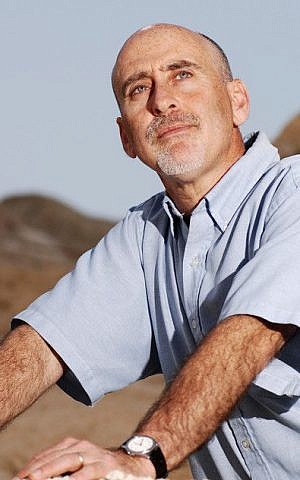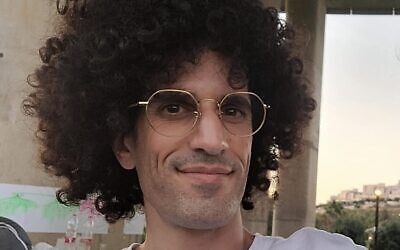Benny Gantz’s first assignment as a young army recruit was to participate in securing Egyptian president Anwar Sadat’s historic visit to Israel in 1977.
Twenty-three years later, he was the last Israeli soldier to leave Lebanon after Israel’s unilateral withdrawal in 2000.
Today, four years after he left the army as its 20th chief of staff, he is the first person in a long while who has a realistic chance of replacing Benjamin Netanyahu as Israel’s prime minister.
Though he has zero political experience and the high-tech company he chaired for three years was a spectacular failure, Gantz, a tall, 59-year-old, father of four, seems to be convincing an increasingly large group of Israeli voters that he can lead the country better than his former boss.
“He’s definitely prime ministerial material,” enthused Dan Arbell, a former Israeli diplomat and today a fellow at the International Institute for Strategic Studies in Washington. “I believe he’s made out of the right stuff: His heart is in the right place, he is strategic thinker, a humanist, he has great military experience. I think he’ll be a great prime minister.”
Despite not having submitted a single piece of legislation, never having conducted coalition negotiations or faced inquisitive reporters’ questions about his political positions, Gantz has built a political platform, and an alliance with Yesh Atid’s Yair Lapid, that poses the biggest threat to date to Netanyahu’s decade-long rule.
The former army chief’s lack of political experience doesn’t necessarily mean he won’t do well as prime minister, argued Arbell, who 10 years ago worked with Gantz at the Israeli embassy in Washington and today teaches Israeli politics and public policy at the American University there. “He’ll learn as he goes along. He has good advisers.”
Gantz was doing reasonably well in the polls even before he founded his Israel Resilience party in December. But for the first few weeks of the current election season, the party did not really threaten the ruling Likud, which seemed set fair for another victory under Netanyahu.
But shortly before the deadline for submitting Knesset electoral slates last month, the rookie politician merged Israel Resilience with two other parties — former Likud defense minister and IDF chief Moshe Ya’alon’s Telem and Lapid’s Yesh Atid — and co-opted a third former IDF chief, Gabi Ashkenazi.
Blue and White, as the new alliance is called, is a motley crew: those three former army chiefs, a few former journalists, two ex-Netanyahu aides, an outgoing labor union chief, a former deputy mayor of Tel Aviv, and various other self-proclaimed centrists who seemingly have little in common besides their desire to dethrone Netanyahu.
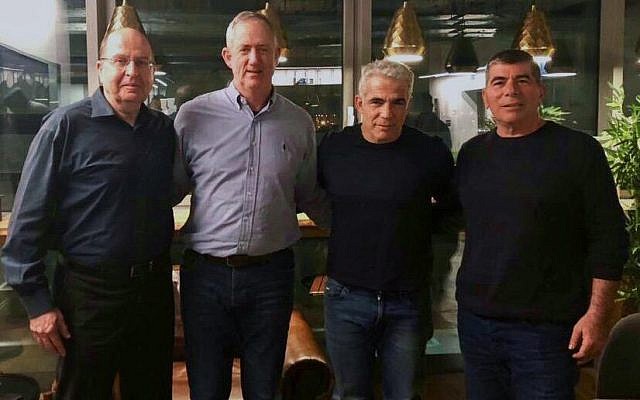
But despite the apparent ideological dissonance among its Knesset hopefuls, the alliance is proving more popular than its various parts proved when running separately. Some surveys suggest it could curtail the Netanyahu era, and the prime minister has told his supporters that he’s worried.
One of the main reasons for the new slate’s anticipated success is Gantz’s personal popularity. There are people on the Blue and White ticket who have the same military experience — Ya’alon and Ashkenazi, his predecessors as chiefs of staff, were once his superiors — and are arguably more competent in the political and financial realms. His initial political speeches have been rather stiff presentations, but his supporters insist he radiates charisma.
“He’s a natural leader. He doesn’t try. He just is,” gushed Alon Tal, an environmentalist and number 45 on Blue and White’s Knesset list. “Leaders aren’t made, they are just born. Benny is such a leader.”
Tal, who moved to Israel from the US, has been close to the would-be prime minister and his family for many years and considered Gantz’s parents his adopted grandparents.
“His father was a farmer, and he would play cantorial music in the car. They were very Jewish,” Tal recalled. “The entire family was very warm… I was a new immigrant, and they totally embraced me.”
Years after they met, Gantz coincidentally became Tal’s company commander in the army.
To the soldiers in his unit it was “obvious” that he would one day become the chief of staff, “because he was the best officer any of us ever had,” Tal remembered in a recent interview. “You either have a moral compass or you don’t. The army is a place where you can’t hide it.”
Michael Oren, who was the Israeli ambassador to Washington when Gantz served as the embassy’s military attache, had a similar experience.

“I first met Benny a decade earlier during reserve duty, a tall, quiet, honest man — an American might imagine him living in a log cabin — and told [my wife] Sally that someday he would command the army,” he recalled in his memoirs.
‘My life has begun before I was born’
Gantz was born in 1959 in Kfar Ahim, a moshav near Kiryat Malachi, to Holocaust survivors. His late mother Malka, who hailed from Hungary, saved a 12-year-old girl from certain death by pulling her from a pile of bodies in a Nazi concentration camp.
“In many ways, my life has begun before I was born,” Gantz said last month at a conference in Munich. “It began in the moment my mother Malka walked out of the Bergen-Belsen concentration camp. I will always remember the ones who never came out.”

Gantz, who has three sisters, attended boarding school in the Kfar Hayarok youth village, in central Israel. Accusations surfaced last month that as a teen he exposed himself to a classmate there. Gantz vehemently rejects the claim, which came just as Blue and White began to ascend in the polls.
In 1977, Gantz joined the Paratroopers Brigade and quickly rose through the ranks.
“You never felt he acted superior to you,” Dan Emergui, one of Gantz’s radiomen in the paratroopers, recently told the Haaretz newspaper. Despite the difference in rank, Gantz “never had to raise his voice. Some commanders issue orders. He just asked and people wanted to carry out whatever he said.”

Emergui also recalled how his crew was attacked by Hezbollah in Lebanon. “Benny kept cool, calling in cover from tanks and helicopters. There were more senior officers in the ops center, but they didn’t intervene because they could hear on the radio that everything was under control.”
A few months later, a jeep carrying Emergui and Gantz outside of Jerusalem was hit by four Molotov cocktails. “We got out and couldn’t see a soul. Benny wouldn’t let us open fire — not even warning shots. He doesn’t shoot just for the sake of it.”

In 2000, Gantz was the commander of the IDF’s Judea and Samaria Division when 19-year-old Druze border guard Madhat Yusuf bled to death after clashes at Joseph’s Tomb in Nablus.
According to Israel’s investigation of the event, Yusuf died because Palestinian security forces prevented his medical evacuation for more than five hours. An IDF inquiry into the incident found no fault with the actions of the commanders in the field.
With Gantz’s entry into politics 19 years later, right-wing politicians recalled the incident and accused Gantz of having abandoned Yusuf. “Benny Gantz was one of those commanders who turned his back on him,” Likud Minister Gilad Erdan charged earlier this year.
‘I saw legislators on Capitol Hill standing in line to greet him and to thank him for his service’
In 2007, Gantz went to Washington to serve as the embassy’s defense attache.
Lior Weintraub, the embassy’s former chief of staff and spokesperson, said Gantz was well-respected not only in the Pentagon, but also in the administration, Congress and the Jewish community.
“I saw legislators on Capitol Hill standing in line to greet him and to thank him for his service. He was very much appreciated,” he recalled.
Gantz was deeply involved in strengthening US-Israeli defense ties, including efforts to guarantee Washington’s ongoing support for Jerusalem’s so-called qualitative military edge, Weintraub said.
“I attended several meetings and briefings with him dealing with the Palestinians in Gaza and with the Iranian nuclear threat, at the State Department and the National Security Council. He did an excellent job,” added Weintraub.
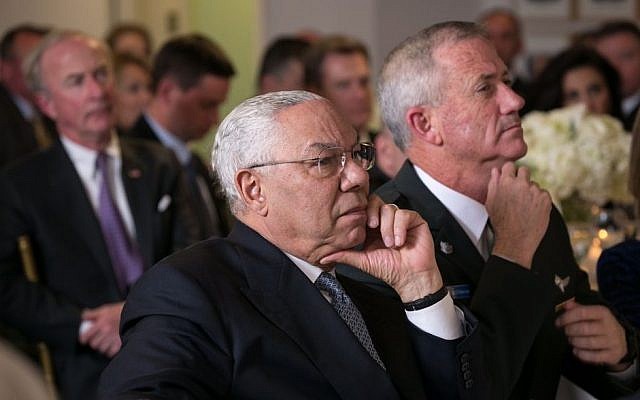
Gantz’s current political opponents seek to portray him as a “weak leftist,” but Weintraub said he never saw anything that would support that claim.
“There was no room for politics in his work at the embassy,” Weintraub said. “I never saw or heard him do anything that had to do with politics. He was always focused on his task, and never got bogged down in political issues.”
Upon his return from DC, Gantz served for two years as deputy chief of staff before retiring from the army, having not been selected for the top job. But after the planned appointment of Yoav Gallant (today a Likud minister and a critic of the Blue and White leader) fell through, Gantz was tapped for the post. After considering the offer for a few days, he agreed to come out of retirement.
For some, the fact that Gantz wasn’t the first choice chief of staff indicates a weakness that he’ll carry into politics.
“Benny is an accidental appointment,” a former general recently told Haaretz about Gantz’s promotion to lieutenant general, the army’s highest rank. “He wasn’t ruthless and didn’t have a burning desire, and still got the job. He’s a nice guy and very fortunate, but I can’t see how that will be enough for him to take on a political killer like Netanyahu.”

Central events of his term as IDF chief were the release of captured IDF soldier Gilad Shalit in October 2011 — Gantz was not involved in the negotiations that led to the soldier’s liberation from Hamas captivity in Gaza, but he was one of the first to embrace Shalit — and two wars with Hamas, Operation Pillar of Defense in 2012 and Operation Protective Edge in 2014.
Just a few years ago, Netanyahu spoke highly of Gantz the military chief.
“He is an experienced commander and an excellent officer. He has all the qualities and all the necessary experience to be an excellent IDF chief of staff,” he declared on February 6, 2011, a few days before the cabinet unanimously approved Gantz’s appointment.

In February 2015, as Gantz wrapped his nearly 40-year military career, Netanyahu thanked him for his “excellent service… including many things that the public is not aware of.” He further praised Gantz then as “a high-quality, ethical, responsible, balanced and thoughtful chief of staff.”
Four years later, Netanyahu is singing a very different tune, as he denounces his subordinate-turned-political opponent as a closet leftist who poses a threat to Israel’s security and economy.

In regard to the latter area, Netanyahu can point to Gantz’s unsuccessful career in the private sector.
After leaving the army, Gantz, who holds master’s degrees in political science and national resource management, became the chairman of a Tel Aviv-based cybersecurity company called Fifth Dimension. In December 2018, after three brief years, the company went bankrupt, having burned through millions of dollars from investors. “I can’t consider the Fifth Dimension to be a success story,” Gantz admitted last month.
‘I’m not some tycoon and I don’t consider myself a businessman’
“It was only one of eight or nine business activities I had. I’m not some tycoon and I don’t consider myself a businessman,” he went on. “I propose we remember that this happens to nine out of 10 high-tech companies. So let’s look at this with the proper perspective.”
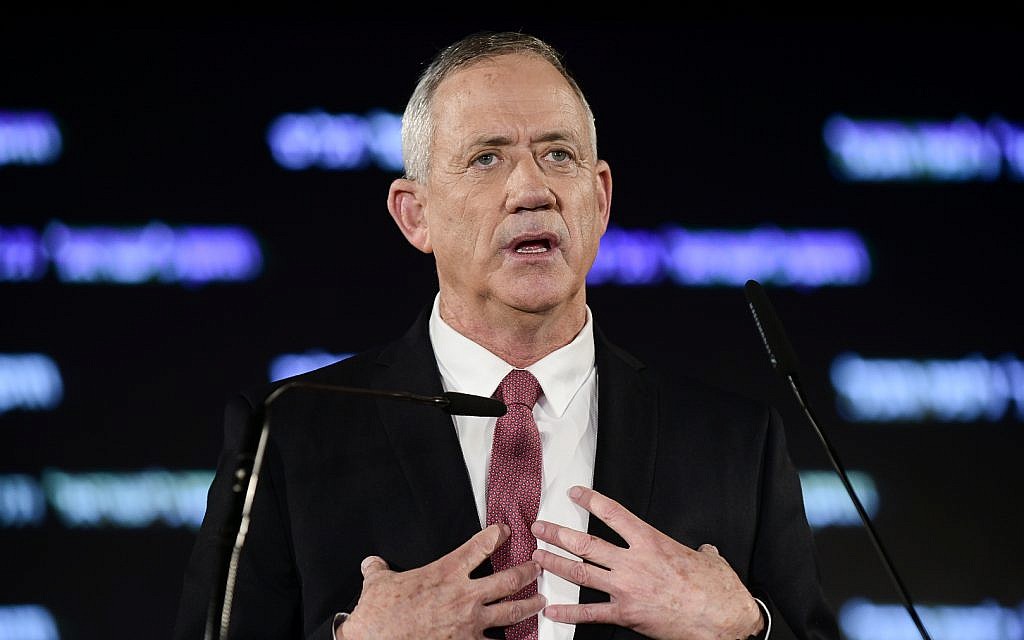
On security and diplomatic matters, it is somewhat harder for the prime minister to attack Gantz, since as an army officer the latter made no political statements, quietly carrying out whatever the commander-in-chief — who for the last ten years was Netanyahu himself — ordered. Nonetheless, denouncing Gantz’s alleged shortcomings on security became a central pillar of Likud’s campaign strategy even before Blue and White set out its political platform.
Netanyahu has claimed, for instance, that Gantz supported the Iran nuclear deal and that he plans to uproot Jewish settlements in the West Bank. The former army chief denies this, but his actual positions on these subjects remain hazy. His insistent vagueness and disinclination to make definitive policy announcements led political commentator Mitchell Barak to call Gantz the “Charlie Chaplin candidate, because he doesn’t really say anything.”
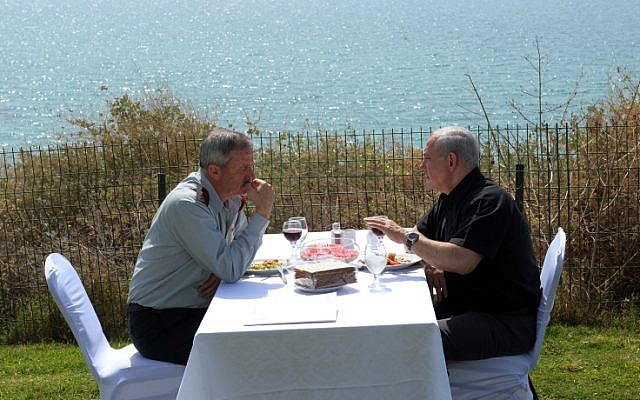
With the exception of one interview, indeed, Gantz has not addressed the press since he entered politics.
On Wednesday, Blue and White published its platform, which calls for a “united” Jerusalem as Israel’s capital, continued Israeli control over the Jordan Valley, and retaining settlement blocs in the West Bank, along with a willingness to enter negotiations with the Palestinians.
A lengthy speech Gantz delivered in Washington in September 2015 offers additional insights into his worldview. The Iran deal could have been better, he said at the time, but he also saw “the half-full part of the glass,” since it was to keep Iran up to 15 years away from nuclear weapons capabilities.
He said then that in light of Israel’s military might, “I refuse to get hysterical on this.”
Addressing the Munich Security Conference last month, however, Gantz called Iran an “evil” regime posing “a grave danger to the Middle East and world order.”
He added that he stands “shoulder-to-shoulder” with Netanyahu in fighting Tehran’s aggression.
Parts of his brief Munich address — read from a teleprompter, and delivered with what some observers saw as awkward body language, apparently reflecting half-learned techniques from public speaking coaches — bore an uncanny resemblance to Netanyahu’s speech to the United Nations last year.
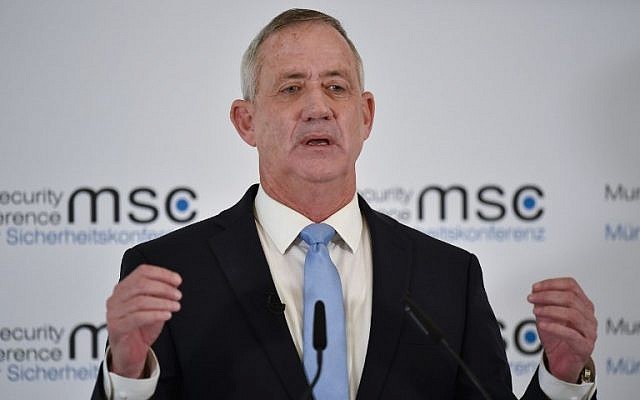
On the Palestinian issue, Gantz has long been vague. He seems to be in favor of a two-state solution, though he has never explicitly backed Palestinian statehood. His party’s manifesto makes no mention of a two-state solution, rejects unilateral withdrawals and vows to undertake major moves on the security front only after holding a referendum or with a special Knesset majority.
In his 2015 address, Gantz said of the conflict: “No one is going anywhere and, therefore, everybody should stick to what’s important and give up all their other dreams.
“We need to stick to security and give up the dreams, as we would like to have them — all governments of Israel have said two-state solution, so this is not news. And the same goes for the Palestinians. If they want to gain sovereignty, they need to give up some of their dreams as well.”
Some Israeli settlements “have major security importance,” he added. He also said that the Jordan Valley remains crucial to Israeli security and suggested it should remain under Israeli military control.

Launching his political career in late January, Gantz vowed to “strengthen the settlement blocs” and to keep Jerusalem united under Israeli sovereignty.
At the same time, he pledged to “strive for peace” and embrace opportunities for “regional change.” If peace proves impossible to achieve, however, he added, “we will shape a new reality,” he said. He has since refused to elaborate.
Gantz’s insistent refusal to face reporters is unsurprising, given that he knows whatever he says to the press can and will be used against him by his political opponents, said Lt.-Col. (res.) Peter Lerner, a former army spokesperson.

“He was always very calculated when going on record,” recalled Lerner, who has arranged several international media appearances for the former chief of staff.
Lerner, an admirer, said that when it comes to his political view, Gantz really is what he says he is — a centrist who cares first and foremost about Israel’s security.
“He believes that we must not stick our heads in the sand and ignore the situation on the ground, but that we need to work hard to better safeguard the State of Israel. If that means negotiating with the Palestinians, does that make him a leftist? I think it makes him more of a realist,” he said.
‘It was pleasant to have someone at such a senior rank who you could speak to and who doesn’t already know everything’
Lerner, who has known Gantz for some 20 years, described his former boss as a calm, collected and thoughtful leader who will listen to advice even from lower-ranking colleagues.
“He’s a very good listener, and that makes him twice a better leader in my view than most of the officers I’ve spent time with. It was pleasant to have someone at such a senior rank who you could speak to and who doesn’t already know everything,” he said.
These are certainly fine character traits, but is this enough to lead a country as complicated as Israel?
“Obviously, leading a big organization in challenging situations is something he has done,” Lerner replied. “Is that enough to survive Israeli politics? I honestly don’t know, because Israeli politics is a whole different battleground.”



